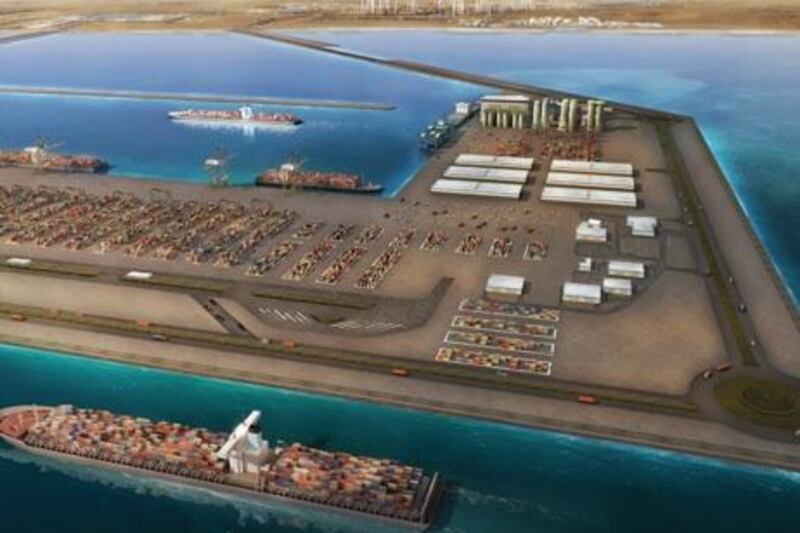The planned Khalifa Industrial Zone of Abu Dhabi is expected to be two-thirds the size of Singapore - but that is not all it wants to share with the Asian tiger.
Industry Insights Forum: In-depth coverage and video reports on Kizad
Last Updated: May 03, 2011
Kizad's key players talk numbers Khalifa Industrial Zone of Abu Dhabi's major players put the project into perspective. Read article
Capital's 'Kizad' free zone fires interest Abu Dhabi Ports Company is seeing strong interest in industrial firms looking to set up facilities at the Kizad project in Taweelah. Read article
Khalifa Port will help take strain of rise in shipments Mina Zayed Port and Musaffah ports are expected to handle 30 per cent more shipments this year. Read article
Abu Dhabi's huge venture to bring in $40bn Kizad is set to play a central role in transforming Abu Dhabi's economy from a reliance on hydrocarbons Read article
[ More from Industry Insights ]
Much as the South East Asian powerhouse diversified its economy through low costs and the ease of doing business there, so Khalifa Industrial Zone (Kizad) is promoting its "one-stop shop" to attract global industrial players to set up manufacturing centres in the industrial park.
The strategy is "allowing local joint venture businesses and international businesses to be able to trade in Kizad in a fashion that makes it easy for them to operate," Tony Douglas, , the chief executive of the Abu Dhabi Ports Company (ADPC), said at The National's Industry Insights forum in the UAE capital yesterday.
The benefits it promises include low operating costs and access to global markets, due to the UAE's location at the crossroads of Asia, Europe and Africa, and its proximity to global shipping lanes.
Those low costs include affordable labour and abundant energy supplies. Energy inputs have periodically been an issue in Abu Dhabi, where huge industrial plans across the emirate have prompted concerns about the availability of sufficient natural gas supplies, which was a factor in convincing the Government to pursue nuclear energy.
But Kizad's location, next to a power plant and the Dolphin gas pipeline, guaranteed stable, dependable energy supplies to clients, said Mr Douglas.
"We have the ability give a cast-iron assurance that the power is available for phase 1A, covering 51 square km," he said.
Phase 1A is due to open by the end of next year and is planned to grow to a 417 sq km site in the coming years as part of Abu Dhabi's 2030 economic vision.
While Kizad is vying with other GCC industrial zones to attract global players in the metals and petrochemicals industries, the project has attracted strong interest due to the stability of the UAE, said Khaled Salmeen, the executive vice president of industrial zones at ADPC.
"Abu Dhabi is the Switzerland of the Middle East," Mr Salmeen said, noting that that perception had helped ADPC "tremendously" in marketing Kizad abroad.
These qualities seem to be paying off for the zone, which hopes to announce a rush of industrial tenants in the second half of this year.
More than 100 companies have applied to set up operations there so far, and more than 25 per cent of those have been given preliminary approval, officials said.
The zone is aiming to attract aluminium and steel producers, and companies from sectors including food and pharmaceuticals, construction and logistics, and paper and glass.
Kizad and the adjoining offshore port is investing in high-tech applications to lower costs for clients, Mr Douglas said.
"It is a long-term piece of infrastructure," he said. "So with that in mind we have developed all the latest technical opportunities into this port.
"Khalifa Port will be the first port in the Middle East region that has got an automated container yard. It will be the first port in the region with direct rail access to the port island, and the container yard will be linked with Etihad rail. And it will be the first in the region to have port-to-ship power connectivity."
The project has been in development since at least 2007 and was marketed as the Khalifa Port and Industrial Zone, with significant emphasis on the 2.7 sq km offshore island where the port is to be located.
But in a subtle shift to emphasise the on-shore aspect of the zone, it was renamed last November as Kizad. Officials at the time said Kizad was an industrial zone supported by a port, rather than the other way around, and announced the Government had granted it free-zone status - a first for an industrial zone in Abu Dhabi.
It will join other industrial zones planned across the emirate spanning semiconductors and aerospace, as well as projects in Musaffah and Ruwais that are pursuing similar tenants in metals and petrochemicals.





